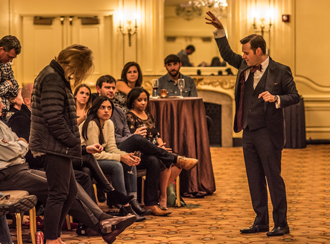
The portrayer of this heroic luminary in that premiere production, along with its many subsequent revivals, is company member Dennis Watkins, himself a prestidigitator with the expertise to re-enact not just spectacular stunts like the "Water Torture Cell" (involving an escape from padlocked chains while immersed head-to-foot in a tankful of water), but also intimate feats of manual dexterity involving cards or everyday objects, the latter performed under the title of The Magic Parlour in a spacious, brightly-lit gold-and-mauve chamber at Chicago's landmark Palmer House hotel.
"My grandfather was a magician, and my uncle, Jeffrey Watkins, as well." Watkins recalls, "My hands were still too small to do what I wanted to do when I started learning the trade, but for thirty years, my grandfather had his own shop in Dallas, so I began with the kind of gadgets that he sold there—containers that made things disappear, and that kind of thing."
When a scripted play calls for someone to perform some magic tricks, the role is usually cast with an entertainer whose primary skills are as a sleight-of-hand artist. Watkins is a bona fide actor, with a degree in theater from Southern Methodist University, but he sees no problem with doing double duty.
"A magician is always concentrating on more than one thing at a time. He's telling a story, first, and he's engineering the false reality that supports the story. He wants the audience to remember the story, but not the moves he's spent thousands of hours learning to conceal. When the magic is working in service of the story—like in Aaron Posner's recent adaptation of The Tempest at Chicago Shakespeare—the role of the magician within that story determines the way the magic is performed. I do the trick with the razor blades in Harry Houdini and also in Magic Parlour, but the execution is completely different. It's always a blessing when you have a strong character to help you hide the mechanics"
 Several Florida critics, in attendance at a recent conference of the American Theatre Critics Association in Chicago, recalled seeing Watkins in the touring production of Harry Houdini and proceeded to pile into taxicabs one night to rush downtown for the Magic Parlour, where he plays—well, himself. Watkins smiles modestly, "That particular persona has evolved over the years, but essentially, it's just me. I may change my tone to suit the occasion, but I think the character is pretty much the same.
Several Florida critics, in attendance at a recent conference of the American Theatre Critics Association in Chicago, recalled seeing Watkins in the touring production of Harry Houdini and proceeded to pile into taxicabs one night to rush downtown for the Magic Parlour, where he plays—well, himself. Watkins smiles modestly, "That particular persona has evolved over the years, but essentially, it's just me. I may change my tone to suit the occasion, but I think the character is pretty much the same."My grandfather always felt that the best magic occurs with small audiences. He'd say that if 500 people see you put somebody in a box and cut that person in half with a sword, they figure it's a special kind of box, but when they see you shred a piece of paper with their name written on it—that they wrote there themselves—and then restore it without even a crease, all this happening only a few feet in front of their eyes, then that is an experience they never forget."
What happens when he gets sick? Do winter sinus infections or throat ailments derail certain tricks? Watkins is quick to note that he has never canceled a performance, but admits, "My show is extremely verbal, so a sore throat can be brutal, and a cold can make me feel really sluggish. Like any other job, though, you soldier through it."
He pauses, "Unless you're escaping from locked chains while holding your breath underwater for the Water Torture stunt and you have a cough. Then you stay home!"
The Magic Parlour is in an open run at the Palmer House, tickets now available through January 2017. (Check out the special prix fixe menu on show nights at the on-site Lockwood restaurant, too.)
Mary Shen Barnidge
Contributing Writer
